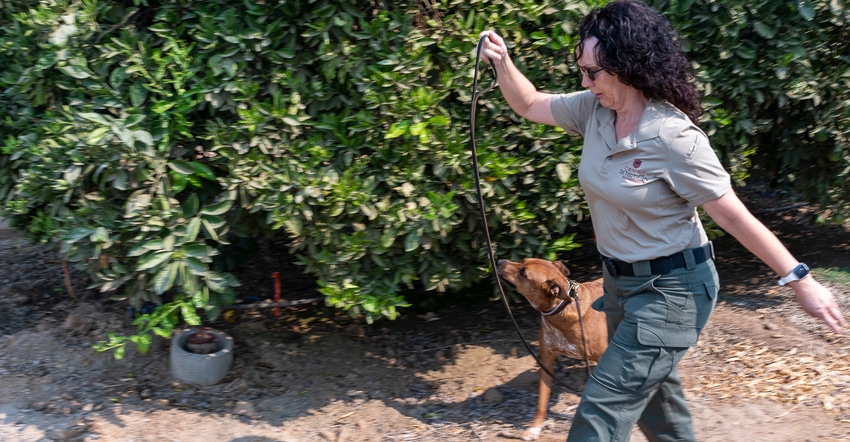
Trained dogs are a new tool for citrus growers to seek and destroy Asian citrus psyllid (ACP) populations in their groves.
The tiny insect blamed for spreading huanglongbing (HLB) in California, Texas and Florida can be spotted by trained eyes, but their size makes it difficult to see without knowing what to look for.
Much like a drug-sniffing dog, the trained canines use their keen sense of smell to detect the ACP. These dogs are not trained to sniff out the HLB disease they vector – just the insects. The new method gives commercial growers a greater chance of finding psyllids in their groves and making timely treatment decisions.
While the dogs are not part of a regulatory program authored by the California Department of Food and Agriculture, the company operates under a permit through the CDFA.
Canine Detection Services
Canine Detection Services is a licensed and bonded company based in Fresno, Calif. Among the services they provide, commercial citrus growers have access to the dogs through a grant provided by the USDA. The grant pays the company to sniff out ACP in commercial settings, giving growers free access to their abilities to find the invasive insect. That grant ends in March 2022.
Lisa Finke, owner of Canine Detection Services, says the dogs are trained to sniff out ACP using training aids. The training aids contain psyllid scent without the Candidatus Liberibacter asiaticus (CLas) bacterium. Testing of the dogs was overseen by researchers from the University of California and the California Citrus Research Board. Dogs are certified by the World Detector Dog Organization, a non-profit organization that certifies canines used by police, fire firefighters, the public and private investigators.
Finke's work in commercial citrus followed studies in southern California and the San Joaquin Valley. The trained canines move in a specified pattern, either at the edge of the grove, or throughout the orchard. Dogs will sniff all sides of the trees in a search pattern. They can smell an ACP within 22 feet, depending on the wind, she said.
Canine Detection Services is also working with CDFA inspectors in residential neighborhoods, according to Victoria Hornbaker, director of the Citrus Pest and Disease Prevention Division within the CDFA. In this instance, Finke's dog handlers shadow CDFA inspectors as they survey residential citrus trees for the pest and disease.
Hornbaker says the dogs can be a valuable tool for state inspectors to survey neighborhoods more quickly. If a dog alerts on a tree, inspectors can investigate for ACP adults or nymphs, and collect insect samples. This is also done in conjunction with surveys for the HLB disease.
Grower assistance
The dog team services are free to commercial growers in California, Arizona, and Texas through next March, according to Finke. To schedule a visit or for answers to specific questions, contact Finke by email at [email protected].
About the Author(s)
You May Also Like






